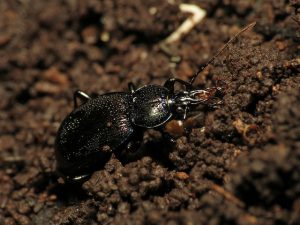Pest predator beetles benefit from conversion to organic farming
 Photo credit: Katja Schulz
Photo credit: Katja Schulz
A new study published in Agriculture, Ecosystems and Environment sought to understand the effect of conversion from conventional farming to organic farming on carabid beetles, also known as ground beetles, a group of insects that provide important biological control of agricultural insect pests. Researchers assessed changes in ground beetle assemblages in nine fields in northern Germany for 15 years after conversion from conventional to organic. At the start of the study, ground beetle assemblages were very similar across all fields. After the conversion to organic, the ground beetle communities diversified. Overall, the ground beetle communities became more diverse, and different beetles showed preference for different fields. With respect to ground beetles that demonstrate habitat preferences, the study found that carabid beetles that prefer forest margins became less abundant in fields, and beetles that prefer open habitats became more abundant and widespread within the fields--suggesting that open field species of carabid beetles will benefit the most from conversion to organic.

